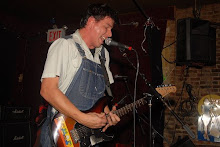If you're not familiar with Gyorgy Kurtag,
Hurry Up Please Its Time .
Eotvos Conducts Kurtag at
Carnegie Hall, 2009

Peter Eötvös,conductor
Natalia Zagorinskaya, soprano
Katalin Károlyi, mezzo-soprano
Ildikó Vékony, cimbalom
Miklós Perényi, cello
UMZE Ensemble
Amadinda Percussion Group
Zankel Hall, New York City

(alt. art thanks to Arno)
January 31st, 2009
MR3 Bartók Radio internet stream 320 kbit/s
recorded and uploaded by KaKa (thank for the good s.. uh, stuff)
The concert included Ligeti performances, which KaKa has linked in the comments.
Messages of the Late R.V. Troussova, Op. 17
Splinters, Op. 6c
Four Poems by Anna Akhmatova, Op. 41- World Premiere:
- I. Pushkin (1997) pour soprano solo, dédié à Natalia Melnikova.
- II. Alexandru Bloku (1997) pour soprano solo.
- III. Plach - Prichitanie (1997), pour soprano et instruments, dédié à Márta Papp.
- IV. Voronezh (in progress), pour soprano et ensemble.
Kurtag's music is mostly super short pieces, linked together by many levels of connective tissue. Perfect for the ADHD set hungry for depth. Any given piece feels like an emotional snapshot; it gives some mechanism of my inner life expression in a quick, immediate and faithful language. It feels right.
Bruce Hodges from MusicWeb International's site had some illuminating comments on this concert. Calling the first part "uncompromising", He writes about "Messages of the Late R. V. Troussova, a 21-song cycle using wrenching, hallucinatory texts by Rimma Dalos, a Russian poet living in Hungary. When soprano Natalia Zagorinskaya began "Odinochestvo" ("Loneliness"), her voice seemed a bit small for the job. But then it turned out that her wan tone, capped with a desolate glissando at the end, was merely her strategy for the opening, rather than revealing all of Kurtág's colors at once.
The cycle grows progressively stranger, with a cumulative effect that is harrowing. The introduction to "Chastushka" (which begins, "Bite me on the head, bite me on the breast!") sounds like a deranged marching band. The composer sets "Great misery—that's love. Is there any greater happiness?" with delicate cimbalom strokes, as if the words would somehow be comforting. "Kameshki" ("Pebbles") uses kaleidoscopic instrumental colors to depict the stones, and in "Tonkaia igla" ("A slender needle"), the effect is piercing, like glass breaking. Ms. Zagorinskaya was in complete control of Kurtág's unconventional meldings of music and text, and the UMZE Ensemble provided exquisitely calibrated touches of sound—truly, sometimes that's all they were—to assist her.
In what may have been the night's sleeper hit, Ildikó Vékony gave a virtuoso performance of Splinters, originally conceived for guitar and adapted for cimbalom. In four compact movements totaling seven minutes, it covers a huge array of textures, before reaching a haunting ending with a low D, repeated softly as it fades into the distance. Ms. Vékony's concentration on the instrument was almost supernatural. Only after a respectful silence at the end did the audience break out into whoops of delight. As she took her curtain calls she seemed slightly stunned, as if she didn't quite know what she had accomplished.
Ms. Zagorinskaya and the UMZE musicians returned for the world premiere of Four Poems by Anna Akhmatova, written over the span of a decade. It is brief, gossamer and adds a huge array of percussion instruments to the chamber ensembl
e. The final song, "Voronezh," incorporates a whip and a siren to evoke "…a whole town…encased in ice…Trees, walls, snow, as if under glass."




























